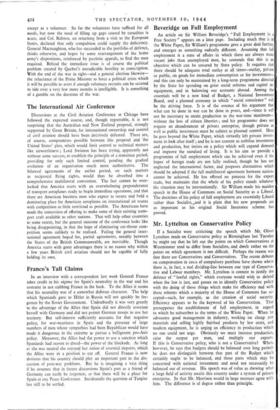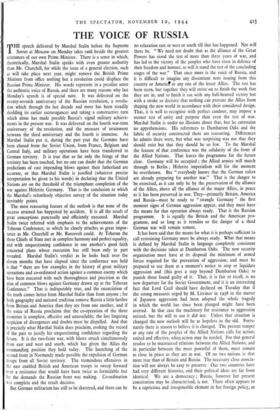except as a volunteer. So far the volunteers have sufficed
for all needs, but now the need of filling up gaps caused by casualties is acute, and Col. Ralston, on returning from a visit to the European fronts, declared that only compulsion could supply the deficiency. General Macnaughton, who has succeeded to the portfolio of defence, thinks otherwise, and hopes by some rearrangement of the home army's dispositions, reinforced by patriotic appeals, to find the men required. Behind the immediate issue is of course the political problem created by Quebec's ineradicable hostility to conscription. With the end of the war in sight—and a general election likewise— the reluctance of the Prime Minister to force a political crisis which it will be possible to avert if enough voluntary recruits can be secured to tide over a very few more months is intelligible. It is something of a gamble on the duration of the war.
The International Air Conference
Discussions at the Civil Aviation Conference at Chicago have followed the expected course, and, though regrettable, it is not surprising that the Australian and New Zealand proposal, strongly supported by Great Britain, for international ownership and control of civil aviation should have been decisively defeated. There are, of course, compromises possible between this proposal and the United States' plan, which would limit control to technical matters like airworthiness ; Lord Swinton has been trying, apparently not without some success, to establish the principle of a transition period, providing for only such limited control, pending the gradual evolution of an organisation much more authoritative. The bilateral agreements of the earlier period, on such matters as reciprocal flying rights, would thus be absorbed into a comprehensive multilateral convention. The fact cannot be over- looked that America starts with an overwhelming preponderance of transport aeroplanes ready to begin immediate operations, and that there are American business men who expect to secure and hold a dominating place for American aeroplanes on international air routes with competition as little restricted as possible. The Americans have made the concession of offering to make some of their existing trans- port craft available to other nations. That will help other countries to some extent, but the general outcome of the conference looks like being disappointing, in that the hope of eliminating cut-throat com- petition seems unlikely to be realised. Failing the general inter- national agreement hoped for, partial agreements, notably between the States of the British Commonwealth, are inevitable. Though America starts with great advantages there is no reason why within a few years British civil aviation should not be capable of fully holding its own.
Franco's Tall Claims
In an interview with a correspondent last week General Franco takes credit to his regime for Spain's neutrality in the war and his restraint in not stabbing France in the back. To the Allies it seems that his neutrality was of a somewhat dubious character. The help which Spaniards gave to Hitler in Russia will not quickly be for- gotten by the Soviet Government. Undoubtedly it was very greatly to the advantage of the Allies that Spain did not directly associate herself with Germany and did not permit German troops to use her territory. But self-interest sufficiently accounts for that negative policy, for war-weariness in Spain and the presence of large numbers of men whose sympathies had been Republican would have made it dangerous in the extreme to pursue a belligerent pro-Axis policy. Moreover, the Allies had the power to use a sanction which Spaniards had reason to dread—the power of the blockade. As long as she was neutral she enjoyed her ration of essential imports, which the Allies were in a position to cut off. General Franco is now desirous that his country should play an important part in the dis7 cussion of post-war problems. But he is imagining a vain thing if he assumes that in future discussions Spain's part as a friend of Germany can easily be forgotten, or that there will be a place for Spain at any Peace Conference. Incidentally the question of Tangier has still to be settled. An article on Sir William Beveridge's " Full Employment in a Free Society " appears on a later page. Including much that is in the White Paper, Sir William's programme goes a great deal further and emerges as something radically different. Assuming that full employment is a state of affairs in which there are always more vacant jobs than unemployed men, he contends that this is an objective which can be ensured by State policy. It requires that there should be adequate total outlay at all times—outlay, private or public, on goods for immediate consumption or for investment— and this can only be maintained by a long-term programme directed by the State for spending on great social reforms and capital re- equipment, and in balancing our accounts abroad. Among the essentials will be a new kind of Budget, a National Investment Board, and a planned economy in which " social conscience " will be the driving force. It is of the essence of his argument that what can be done in war can be done in peace, and—since it will riot be necessary to strain . prqduction to the war-time maximum— without the loss of citizen liberties ; and his programme does not require an abandonment of privatz enterprise, though private as well as public investment must be subject to planned control. Here he goes beyond the White Paper, which virtually left private invest- ment to look after itself ; and he is not content to stabilise investment and production, but insists on a policy which will expand demand and improve the standard of living. It is his aim to provide a programme of full employment which can be achieved even if the hopes of foreign trade are not fully realised, though he has not neglected the international factor, and proposes alternatives which should be adopted if the full multilateral agreement between nations cannot be achieved. He has offered no panacea for the export trade, but maintains that the whole of his policy stands whatever the situation may be internationally. Sir William made his maiden speech in the House of Commons on Social Security as a Liberal. The doctrines of his policy of full employment are essentially Liberal rather than Socialist,sand it is plain that his new proposals are as important as his original Social Insurance scheme has proved.
Mr. Lyttelton on Conservative Policy
If a Socialist were criticising the speech which Mr. Oliver Lyttelton made on Conservative policy at Birmingham last Tuesday he might say that he left out the points on which Conservatives at Westminster tend to differ from Socialists, and dwelt rather on the points on which agreement is not difficult. Perhaps the reason was that there are Conservatives and Conservatives. The recent debates on compensation in cases of compulsory purchase have shown where there is, in fact, a real dividing-line between one type of Conserva- tive and Labour members. Mr. Lyttelton is content to justify the defence of " lawful rights," which everyone would wish to defend when the law is just, and passes on to identify Conservative policy with the doing of those things which make for efficiency and with those reforms which a majority of the House of Commons has ac- cepted—such, for example, as the creation of social security. Efficiency appears to be the keyword of his Conservatism. That presupposes the establishment of full employment, in regard to which he subscribes to the terms of the White Paper. When he advocates good management in incinstry, working on cheap raw materials and selling highly finished products by low costs, and modern equipment, he is urging an efficiency in production which no one could not urge. Obviously we must increase production, raise the output per man, and multiply our exports.
If this is Conservative policy, who is not a Conservative? When, however, he says that budgets should be balanced over long periods he does not distinguish between that part of the Budget which certainly ought to be balanced, and those parts which may be concerned with national investment and need not necessarily be balanced out of revenue. His speech was of value as showing what a large field of activity awaits this country under a system of private enterprise. In that Mr. Morrison would in large measure agree with him. The difference is of degree rather than principle.
THE VOICE OF RUSSIA
THE speech delivered by Marshal. Stalin before the Supreme Soviet at Moscow on Monday takes rank beside the greatest utterances of our own Prime Minister. There is a sense in which, theoretically, Marshal Stalin speaks with even greater authority than Mr. Churchill, for while the issue of a general election, such as will take place next year, might remove the British Prime



























 Previous page
Previous page